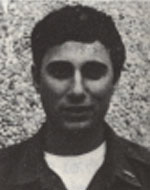Alon, son of Shoshana and Avraham, was born on December 29, 1952, in Beit Hashita. His parents, members of a group of circles, are among the founders and builders of the kibbutz. He attended elementary school and then at the high school in Beit Hashita. During his studies, Alon was discovered as a curious youngster, who frequently questioned and asked questions that his contemporaries accepted as obvious. According to his educators, any problem that required a thorough investigation and an original solution would arouse his interest. In every field, he dealt with the seriousness that characterized him as older than him, when he distinguished between god and bad, and always sought the essential and fundamental aspect. He was aware of discoveries and innovations and sought an innovative and original perspective to examine the problems he encountered. He was always willing to share with his friends the knowledge he had acquired in his studies. Alon frequently participated in the social activities of his peers. He was the secretary of the children’s company in the kibbutz. One of the teachers, a questioner who studied with her, described his teenage years: “He was a fighter, a man who bought his world with hard, moderate, planned work, But I knew that he would be a great man, that in every work he would invest in himself, whether in a metalwork shop or in a field, in a technical or scientific profession, there would be harmony, accuracy, and wholeness, That time and forgetfulness will not be able to. ” Alon was recruited to the IDF in early January 1971 and volunteered for the Israel Air Force, where he successfully passed the tests and was accepted to the pilots’ course. But he did not finish the course and therefore asked to join the Armored Corps, Alon graduated with honors from an artillery training course and a tank commander course and was assigned to a tank battalion in Sinai and was sent to an officers’ course. where he broke his leg and had a cast for half of the time in the course, although the doctors told him to leave, He insisted on continuing his training and succeeded in finishing it, and Alon completed his officers’ training course as one of the three outstanding cadets, and asked to serve in the tank battalion in Sinai, where he began his career in the Armored Corps and returned to the battalion as commander of a tank division in the central sector of the Suez Canal. Alon served as a tank commander, and he was familiar with the tank and gave his soldiers the vast knowledge he acquired in the officers’ course, and his department was one of the best in both training and operational activity. Alon never raised his voice or got upset at any of his soldiers. On the day of Yom Kippur, October 6, 1973, when the fighting broke out, Alon headed with his department to the “Furqan” stronghold in Ismailia, at which time the Egyptians’ attack was in full swing. Alon, who saw the tank on fire, went out to rescue him, his tank mounted on an ambush by Egyptian soldiers, and Alon was killed from the fire that was shot at him. he was laid to rest at the Beit Hashita cemetery, leaving behind his parents, three brothers and a sister. The family published a pamphlet in his memory, in which teachers and friends spoke about his figure: “In truth, Alon was not enthusiastic about things, but when I had to motivate people, I did it with Alon. He had a natural leadership and people listened to him. It was not a simple task, even for him, to order as a commander, for people who were soldiers with him a year earlier, especially when it meant doing unpleasant things, even insignificant things. But Alon, thanks to his personality, managed to do it. “
